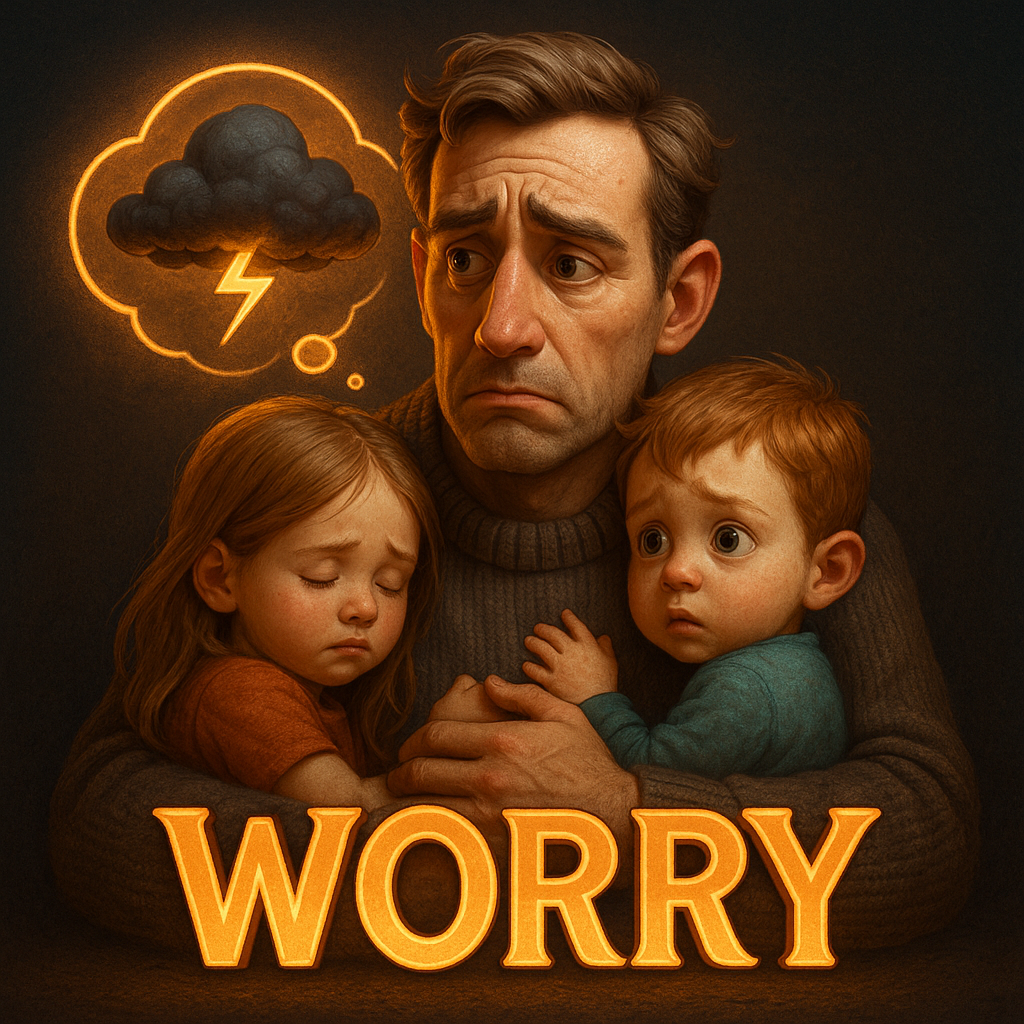Worry
Definition
Worry refers to the state of feeling anxious or troubled about actual or potential problems. As a verb, it means to experience or cause anxiety.
Parts of Speech
- Noun
- Verb
Pronunciation
American English
- IPA Pronunciation: /ˈwɜː.ri/ or /ˈwʌr.i/
- Respelling: WUR-ee or WUH-ree
British English
- IPA Pronunciation: /ˈwʌr.i/
- Respelling: WUH-ree
Etymology
The word "worry" originates from Old English "wyrgan," meaning "to strangle." It later evolved in Middle English to mean "to harass or vex," before taking on its modern sense of anxiety or unease in the 16th century.
Derivatives
- Worried (adjective)
- Worrisome (adjective)
- Worrying (adjective)
- Unworried (adjective)
- Overworry (verb)
Synonyms
- Anxiety
- Concern
- Apprehension
Antonyms
- Calm
- Peace
- Relaxation
Usage
The noun "worry" is used to describe a feeling of concern, as in "Her main worry was the upcoming deadline." The verb form describes the act of feeling or causing anxiety, such as "He tends to worry about small things."
Related Terms
- Anxiety: A feeling of unease or nervousness.
- Fear: An emotional response to perceived danger.
- Stress: A state of mental or emotional strain.
Detailed Definitions
Noun
- A feeling of anxiety or concern: Refers to an emotional state caused by fear of potential problems.
- Example: "Her financial troubles were a constant source of worry."
- A cause of concern: Refers to something that induces worry or unease.
- Example: "The safety of the children was his primary worry."
Verb
- To feel anxious or troubled: Describes experiencing concern or unease.
- Example: "She couldn’t stop worrying about her exam results."
- To cause someone else to feel anxious: Refers to actions that induce concern in another person.
- Example: "The delay in his arrival worried his family."
worry



🇨🇳 Mandarin Chinese
- 担忧 (Worry - verb)
- IPA: /tan˥˩ joʊ˧˥/
- English Respell: dānyōu
- 忧虑 (Worry - noun)
- IPA: /joʊ˧˥ ly˥˩/
- English Respell: yōulǜ
🇮🇳 Hindi
- चिंता करना (To worry)
- IPA: /tʃɪnt̪a kəɾna/
- English Respell: chintā karnā
- चिंता (Worry - noun)
- IPA: /tʃɪnt̪a/
- English Respell: chintā
🇪🇸 Spanish
- Preocupar (To worry)
- IPA: /pɾeokuˈpaɾ/
- English Respell: preocupar
- Preocupación (Worry - noun)
- IPA: /pɾeokupaˈθjon/
- English Respell: preocupación
🇫🇷 French
- S'inquiéter (To worry)
- IPA: /sɛ̃kiete/
- English Respell: s'inquiéter
- Inquiétude (Worry - noun)
- IPA: /ɛ̃kjetɥd/
- English Respell: inquiétude
🇦🇪 Arabic (Modern Standard)
- القلق (To worry)
- IPA: /æl'ʔælʔ/
- English Respell: al'qlq
- قلق (Worry - noun)
- IPA: /'ʔælʔ/
- English Respell: qlq
🇧🇩 Bengali
- চিন্তা করা (To worry)
- IPA: /tʃint̪a kɔɹa/
- English Respell: chinta kara
- চিন্তা (Worry - noun)
- IPA: /tʃint̪a/
- English Respell: chinta
🇷🇺 Russian
- Беспокоиться (To worry)
- IPA: /bʲɪspɐˈkojɪtsə/
- English Respell: bespokoit'sya
- Волнение (Worry - noun)
- IPA: /vɐˈlʲnʲenʲɪjə/
- English Respell: volneniye
🇵🇹 Portuguese
- Preocupar-se (To worry)
- IPA: /pɾeo.kuˈpaɾ.sɨ/
- English Respell: preocupar-se
- Preocupação (Worry - noun)
- IPA: /pɾeo.kupaˈsɐ̃ʊ̯/
- English Respell: preocupação
🇮🇩 Indonesian
- Mencemaskan (To worry)
- IPA: /mentʃemasˈkan/
- English Respell: mencemaskan
- Kecemasan (Worry - noun)
- IPA: /kətʃəˈmasan/
- English Respell: kecemasan
🇩🇪 German
- Sich sorgen (To worry)
- IPA: /zɪç ˈzɔrɡn̩/
- English Respell: sich sorgen
- Sorge (Worry - noun)
- IPA: /ˈzɔrɡə/
- English Respell: Sorge
🇯🇵 Japanese
- 心配する (To worry)
- IPA: /ɕimpa.i su.ɾu/
- English Respell: shinpai suru
- 心配 (Worry - noun)
- IPA: /ɕimpa.i/
- English Respell: shinpai
🇻🇳 Vietnamese
- Lo lắng (To worry)
- IPA: /lɔ˧˩ laŋ˧˥/
- English Respell: lo lắng
- Lo lắng (Worry - noun)
- IPA: /lɔ˧˩ laŋ˧˥/
- English Respell: lo lắng
🇰🇷 Korean
- 걱정하다 (To worry)
- IPA: /kʌk̚t͈ɕ͈oŋhada/
- English Respell: geokjeonghada
- 걱정 (Worry - noun)
- IPA: /kʌk̚t͈ɕ͈oŋ/
- English Respell: geokjeong
🇹🇷 Turkish
- Endişelenmek (To worry)
- IPA: /end̪iʃe'lenmek/
- English Respell: endişelenmek
- Endişe (Worry - noun)
- IPA: /en'd̪iʃe/
- English Respell: endişe
🇵🇰 Urdu
- پریشان ہونا (To worry)
- IPA: /pəreːʃaːn hona/
- English Respell: pareśān honā
- فکر (Worry - noun)
- IPA: /fɪkr/
- English Respell: fikr





